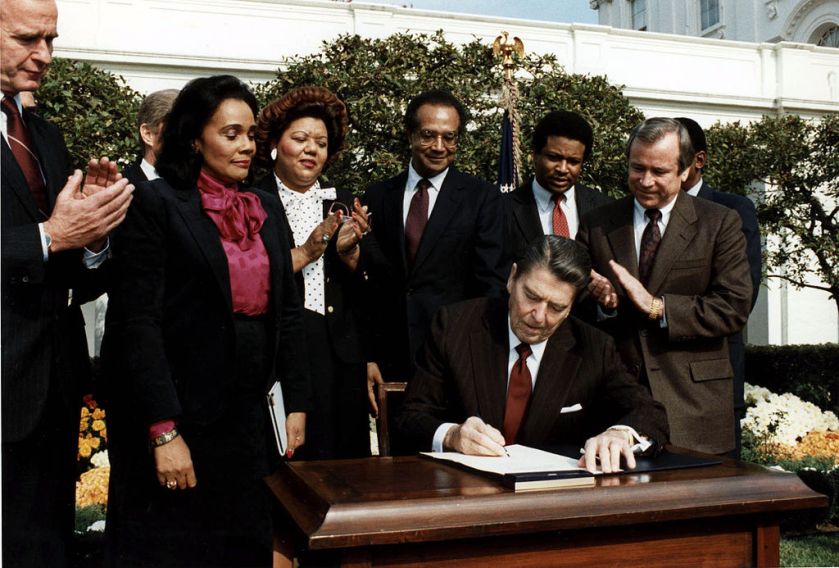
In 2000, Martin Luther King Day was officially observed in all 50 states for the first time. It was a long and arduous battle to gain national recognition for the life of the civil rights icon. If your kids are anything like mine, that is probably hard for them to believe. The life of Martin Luther King Jr. is practically central to the public school civil rights curriculum. It may seem as though the leader was always universally celebrated and respected. In actuality, it wasn’t easy to get national recognition for the slain leader. Here are seven facts to teach your kids about the history of this important day:
1. A bill to make Martin Luther King’s birthday a holiday was first introduced a few months after Dr. King’s death.
In 1968, a few months after Martin Luther King’s assassination, Congressman John Conyers (MI) and Senator Edward Brooke (MA) introduced a bill to make January 15, Dr. King’s birthday, a national holiday. It didn’t go to the House of Representatives until 1979 and failed to pass by five votes.
2. The petition to support the holiday garnered close to six million signatures.
Shortly after Dr. King’s assassination, the King Memorial Center was founded in Atlanta. The center launched a campaign to solicit support for a national holiday from the public and along with the Southern Christian Leadership Conference and King’s widow, Coretta Scott King, garnered millions of signatures in support. As of 2006, it was considered the largest petition in favor of an issue in U.S. history.
3. Stevie Wonder wrote the song “Happy Birthday” to gain support for the holiday.
In 1980, Stevie Wonder’s released the song “Happy Birthday” to popularize the campaign to make Dr. King’s birthday a national holiday. Lyrics include: “I just never understood/ How a man who died for good/ Could not have a day that would/ Be set aside for his recognition/ Because it should never be/ Just because some cannot see/ The dream as clear as he/ That they should make it become an illusion/ And we all know everything/ That he stood for time will bring/ For in peace our hearts will sing/ Thanks to Martin Luther King…”
“Freedom is never voluntarily given by the oppressor. It must be demanded by the oppressed.”
– Martin Luther King, Jr., Letter From Birmingham City Jail
4. Senator Jesse Helms led a filibuster against the bill to create MLK Day.
In 1980, the bill passed in Congress but faced opposition in the Senate. Among those opposed to MLK Day were then-House Republican, now Senator John McCain (AZ) and Senators Jesse Helms and John Porter East, Republicans from North Carolina. Helms and East criticized Martin Luther King for opposing the Vietnam War and accused him of being associated with communists. In October 1983, when the bill once again came before the senate, Senator Helms led a filibuster against the bill. He submitted a 300 page document alleging that King had associations with communists. New York Senator Daniel Patrick Moynihan famously called the document a “packet of filth,” threw it on the Senate floor, and stomped on it. Although President Ronald Reagan initially opposed the bill, he signed the bill into law in 1983. The first official holiday was observed in 1986 by 27 states and the District of Columbia.
5. The NFL moved Super Bowl XXVII from Arizona to California in protest of Arizona’s decision not to recognize the holiday.
Even after the bill passed, many states refused to recognize the holiday. Arizona was among them. 1n 1992, the NFL moved Super Bowl XXVII from Arizona to California to protest the state’s failure to recognize the holiday. In response to the NFL’s protest and growing opposition, Arizona passed legislation to recognize the holiday.
6. South Carolina was the last state to recognize the holiday.
In 2000, South Carolina Governor Jim Hodges signed a bill into law to make MLK Day an official state holiday. Prior to that, citizens could chose between celebrating MLK Day and other holidays celebrating members of the Confederacy. Alabama, Arizona, Arkansas, Idaho, Mississippi, and Virginia continue to combine MLK Day with other observances.
7. MLK Day is celebrated around the world.
Japan, Canada, Israel and The Netherlands hold celebrations in honor of Dr. King.
Sources:
http://content.time.com/time/nation/article/0,8599,1872501,00.html
http://www.webcitation.org/5vnLjow8L
***
About The Author
Faye McCray is an attorney by day and writer all the time. Her work has been featured on My Brown Baby, AfroPunk, AfroNews, For Harriet, Madame Noire, Black Girl Nerds, Black and Married with Kids, and other popular publications. Faye also has a number of short stories and a full length novel available for purchase on Amazon. Most importantly, Faye is a proud wife and mother to three beautiful and talented young boys who she is fiercely passionate about raising. You can find Faye on Twitter @fayewrites and on the web at fayemccray.com.
attorney by day and writer all the time. Her work has been featured on My Brown Baby, AfroPunk, AfroNews, For Harriet, Madame Noire, Black Girl Nerds, Black and Married with Kids, and other popular publications. Faye also has a number of short stories and a full length novel available for purchase on Amazon. Most importantly, Faye is a proud wife and mother to three beautiful and talented young boys who she is fiercely passionate about raising. You can find Faye on Twitter @fayewrites and on the web at fayemccray.com.


Your article was very informative. I’m
so very proud of all the brave people who persevered to honor Dr. King’s legacy.
Lately, I have been thinking about what lonely road it must have been for him. The opposition to his call for justice was probably overwhelming at times. For example, getting people in the South to register to vote – many of them shackled by mental slavery
and feelings of worthlessness.
Dr. King had to tackle this and many more obstacles to realize his dream.
I thank God for him.
Thanks again for this important information.
LikeLike